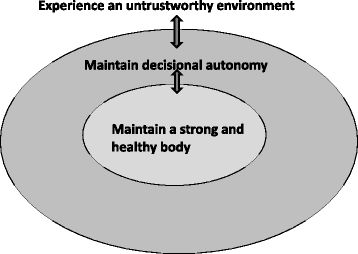Reasons why nurses decline influenza vaccination: a qualitative study
- PMID: 28465672
- PMCID: PMC5410084
- DOI: 10.1186/s12912-017-0215-5
Reasons why nurses decline influenza vaccination: a qualitative study
Abstract
Background: To explore reasons of non-vaccinated nursing staff for declining seasonal influenza vaccination. The annual influenza vaccination of healthcare workers reduces morbidity and mortality among vulnerable patients. Still, vaccination rates remain very low, particularly in nursing staff. While several studies have explored barriers for healthcare workers to get vaccinated, most have used a quantitative approach.
Methods: Data were collected by in-depth individual semi-structured interviews with 18 nurses from a range of fields, positions in organizational hierarchy, work experience and hospitals in two German-speaking cantons in Switzerland. Interviews were transcribed and analysed using conventional content analysis.
Results: Three interconnected themes explaining why nurses decline influenza vaccination were identified: Firstly, the idea of maintaining a strong and healthy body, which was a central motif for rejecting the vaccine. Secondly, the wish to maintain decisional autonomy - especially over one's body and health. Thirdly, nurses' perception of being surrounded by an untrustworthy environment, which restricts their autonomy and seemingly is in opposition to their goal of maintaining a strong and healthy body.
Conclusion: Nurses tend to rely on conventional health beliefs rather than evidence based medicine when making their decision to decline influenza vaccination. Interventions to increase influenza vaccination should be tailored specifically for nurses. Empowering nurses by promoting decision-making skills and by strengthening their appraisal may be important factors to consider when planning future interventions to improve vaccination rates. The teaching of evidence-based decision-making should be integrated on different levels, including nurses' training curricula, their workspace and further education.
Keywords: Attitudes; Influenza; Nurses; Qualitative research; Vaccination.
Figures
Similar articles
-
Nurses' attitudes towards enforced measures to increase influenza vaccination: A qualitative study.Influenza Other Respir Viruses. 2017 May;11(3):247-253. doi: 10.1111/irv.12441. Epub 2017 Jan 31. Influenza Other Respir Viruses. 2017. PMID: 27943585 Free PMC article.
-
Nurses' knowledge and risk perception towards seasonal influenza and vaccination and their vaccination behaviours: a cross-sectional survey.Int J Nurs Stud. 2011 Oct;48(10):1281-9. doi: 10.1016/j.ijnurstu.2011.03.002. Epub 2011 Apr 6. Int J Nurs Stud. 2011. PMID: 21474136
-
Nurses' perspectives regarding the disclosure of errors to patients: A qualitative study.Int J Nurs Stud. 2016 Feb;54:16-22. doi: 10.1016/j.ijnurstu.2014.10.001. Epub 2014 Oct 13. Int J Nurs Stud. 2016. PMID: 25458803
-
Nurses' knowledge, attitudes and practices regarding influenza vaccination: an integrative review.J Clin Nurs. 2016 Oct;25(19-20):2730-44. doi: 10.1111/jocn.13243. Epub 2016 May 21. J Clin Nurs. 2016. PMID: 27206347 Review.
-
The effectiveness of interventions to improve the seasonal influenza vaccination uptake among nurses: A systematic review.J Infect Prev. 2023 Nov;24(6):268-277. doi: 10.1177/17571774231208115. Epub 2023 Oct 20. J Infect Prev. 2023. PMID: 37969468 Free PMC article. Review.
Cited by
-
Factors influencing healthcare professionals' confidence in vaccination in Europe: a literature review.Hum Vaccin Immunother. 2022 Dec 31;18(1):2041360. doi: 10.1080/21645515.2022.2041360. Epub 2022 Mar 15. Hum Vaccin Immunother. 2022. PMID: 35290160 Free PMC article. Review.
-
Health care provider trust in vaccination: a systematic review and qualitative meta-synthesis.Eur J Public Health. 2022 Apr 1;32(2):207-213. doi: 10.1093/eurpub/ckab209. Eur J Public Health. 2022. PMID: 35021201 Free PMC article.
-
Facilitators and barriers to latent tuberculosis infection treatment among primary healthcare workers in Malaysia: a qualitative study.BMC Health Serv Res. 2023 Aug 29;23(1):914. doi: 10.1186/s12913-023-09937-z. BMC Health Serv Res. 2023. PMID: 37644513 Free PMC article.
-
Influenza Vaccination Coverage, Motivators for, and Barriers to Influenza Vaccination among Healthcare Workers in Wroclaw, Poland.Int J Environ Res Public Health. 2022 Jan 30;19(3):1586. doi: 10.3390/ijerph19031586. Int J Environ Res Public Health. 2022. PMID: 35162609 Free PMC article.
-
Editor's Choice: Influenza vaccine uptake, COVID-19 vaccination intention and vaccine hesitancy among nurses: A survey.Int J Nurs Stud. 2021 Feb;114:103854. doi: 10.1016/j.ijnurstu.2020.103854. Epub 2020 Dec 5. Int J Nurs Stud. 2021. PMID: 33326864 Free PMC article.
References
-
- Hayward AC, Harling R, Wetten S, Johnson AM, Munro S, Smedley J, et al. Effectiveness of an influenza vaccine programme for care home staff to prevent death, morbidity, and health service use among residents: cluster randomised controlled trial. BMJ. 2006;333(7581):1241. doi: 10.1136/bmj.39010.581354.55. - DOI - PMC - PubMed
-
- Mereckiene J, Cotter S, Nicoll A, Lopalco P, Noori T, Weber J, et al. Seasonal influenza immunisation in Europe. Overview of recommendations and vaccination coverage for three seasons: pre-pandemic (2008/09), pandemic (2009/10) and post-pandemic (2010/11) Euro Surveill. 2014;19(16):20780. doi: 10.2807/1560-7917.ES2014.19.16.20780. - DOI - PubMed
LinkOut - more resources
Full Text Sources
Other Literature Sources


